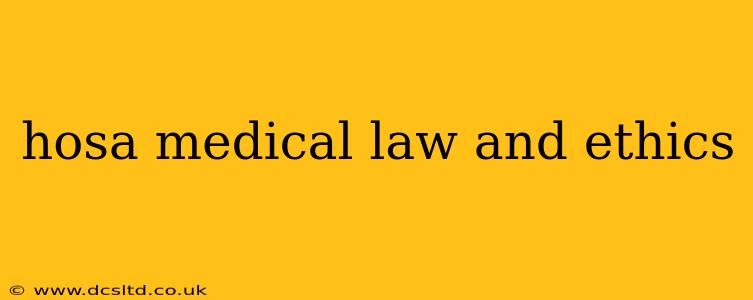The Health Occupations Students of America (HOSA) competition in Medical Law and Ethics requires a deep understanding of legal and ethical principles within healthcare. This guide delves into key areas, providing a comprehensive overview to help students excel. We'll explore crucial concepts and answer common questions students often have regarding this complex and vital subject.
What are the key areas covered in HOSA Medical Law and Ethics?
HOSA's Medical Law and Ethics competition encompasses a broad range of topics, including but not limited to: patient rights, informed consent, confidentiality (HIPAA), medical malpractice, end-of-life care, organ donation, and bioethics. A strong understanding of these areas is crucial for success. The specific focus may vary from year to year, so always consult the official HOSA competition guidelines for the most up-to-date information.
What is the difference between medical law and medical ethics?
This is a fundamental distinction. Medical law refers to the legal rules and regulations governing healthcare practices. It defines the legal responsibilities of healthcare professionals and the rights of patients. Violation of medical law can lead to legal repercussions, including lawsuits and disciplinary actions. Medical ethics, on the other hand, focuses on moral principles and values guiding healthcare decisions. While not legally binding in the same way as laws, ethical considerations are paramount for maintaining professional integrity and providing patient-centered care. Often, ethical considerations inform the development and interpretation of medical laws.
What are patient rights in healthcare?
Patients have a multitude of legal and ethical rights, ensuring they are treated with respect and dignity. These rights typically include:
- The right to informed consent: Patients must be fully informed about their medical condition, treatment options, potential risks and benefits before making decisions about their care.
- The right to confidentiality: Protected by laws like HIPAA in the US, patient information must be kept private and confidential, except in specific circumstances (e.g., mandated reporting of child abuse).
- The right to refuse treatment: Patients have the autonomy to refuse any medical treatment, even if it is recommended by their physician.
- The right to access their medical records: Patients generally have the right to review and obtain copies of their medical records.
How does HIPAA relate to medical law and ethics?
The Health Insurance Portability and Accountability Act (HIPAA) is a US federal law that protects the privacy and security of patient health information. HIPAA establishes strict rules about who can access and disclose protected health information (PHI). Compliance with HIPAA is not only a legal requirement but also an ethical obligation for healthcare professionals. Violations can result in severe penalties.
What is considered medical malpractice?
Medical malpractice occurs when a healthcare professional deviates from the accepted standard of care, resulting in harm to a patient. This involves proving negligence: the professional failed to meet the expected level of care, and this failure directly caused the patient's injury. Proving medical malpractice in court requires expert testimony to establish the standard of care and demonstrate its breach.
What are some ethical dilemmas in end-of-life care?
End-of-life care presents several complex ethical challenges, including:
- Advance directives: Respecting patient wishes expressed through living wills or durable power of attorney for healthcare.
- Palliative care vs. curative treatment: Balancing comfort and pain management with potentially life-extending, but burdensome, treatments.
- Physician-assisted suicide: The ethical and legal implications of assisting a patient in ending their life. This is a highly debated topic with significant legal variations across jurisdictions.
How does organ donation relate to medical law and ethics?
Organ donation involves complex legal and ethical issues surrounding consent, allocation of organs, and potential conflicts of interest. Ethical considerations include fairness in organ distribution, ensuring informed consent from donors (or their families), and addressing potential financial incentives.
What is bioethics?
Bioethics explores the ethical implications of biological and medical advancements. It tackles complex questions related to genetic engineering, cloning, stem cell research, and other emerging technologies, often grappling with the intersection of science, technology, and human values. It is a constantly evolving field adapting to new scientific discoveries and their ethical implications.
This guide provides a starting point for understanding the complexities of medical law and ethics within the context of the HOSA competition. Remember to consult official HOSA resources and engage in further research to deepen your knowledge and prepare effectively for the competition. Good luck!
